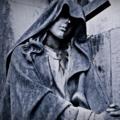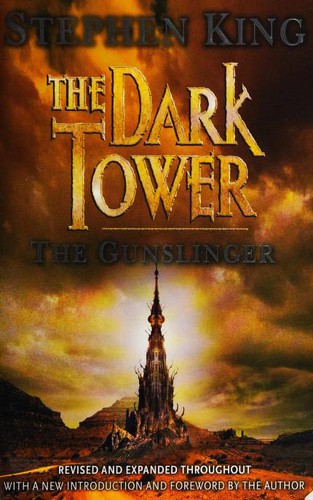Ricardo Lourenço reviewed The gunslinger by Stephen King (The dark tower -- 1)
Review of 'The gunslinger' on 'Goodreads'
4 stars
Escrita ao longo de mais de 30 anos e quase interrompida pelo grave acidente que King sofreu em 1999, a saga The Dark Tower, ao contrário de outros livros mais conhecidos do autor, é uma obra de difícil categorização, apresentando elementos característicos de géneros como a ficção científica, o horror, o fantástico e o western. Apesar de se tratar de uma definição redutora, The Gunslinger apresenta-se, essencialmente, como um misto dos dois últimos; um primeiro passo naquele que é talvez o projecto mais ambicioso na carreira de Stephen King.
"The desert was the apotheosis of all deserts, huge, standing to the sky for what looked like eternity in all directions. It was white and blinding and waterless and without feature save for the faint, cloudy haze of the mountains which sketched themselves on the horizon and the devil-grass which brought sweet dreams, nightmares, death. An occasional tombstone sign pointed the way, for once the drifted track that cut its way through the thick crust of alkali had been a highway. Coaches and buckas had followed it. The world had moved on since then. The world had emptied."
Neste primeiro volume aguarda-nos um cenário apocalíptico, onde se vislumbram ainda alguns resquícios do mundo tal como o conhecemos, muito embora não passem de ecos distantes, relíquias do passado.
Sobre o solo estéril do deserto caminha Roland Deschain, último sobrevivente de uma linhagem de pistoleiros, perseguindo um misterioso homem de negro, elusiva figura que Roland considera ser uma peça fulcral na sua busca pela Torre.
‘Why am I here?’ Jake asked. ‘Why did I forget everything from before?’
‘Because the man in black has drawn you here,’ the gunslinger said. ‘And because of the Tower. The Tower stands at a kind of… power-nexus. In time.’
‘I don’t understand that!’
‘Nor do I,’ the gunslinger said. ‘But something has been happening. Just in my own time. “The world as moved on,” we’ve always said. But it’s moving on faster now. Something has happened to time. It’s softening.’
O mundo de Roland entrou numa espiral de decadência que afecta até as próprias leis da física. Convicto de que a única forma de compreender e reverter a enigmática degradação reside na Torre, Roland está disposto a enfrentar quaisquer dificuldades para a alcançar, confiando para tal nos seus instintos e na sua proficiência com as armas. De resto, a descrição da agilidade do pistoleiro é captivante, demonstrando ao mesmo tempo o forte controlo que Roland exerce sobre as suas emoções. E, apesar das incógnitas contidas em The Gunslinger, o livro acaba por se focar neste homem capaz de prosseguir perante as adversidades, inabalável nas suas convicções; uma personagem forte e carismática à altura do desafiante caminho que aguarda todos os que procuram a Torre.
"The guns were empty and they boiled at him, transmogrified into an Eye and a Hand, and he stood, screaming and reloading, his mind far away and absent, letting his hands do their reloading trick. Could he hold up a hand, tell them he had spent a thousand years learning this trick and others, tell them of the guns and the blood that had blessed them? Not with his mouth. But his hands could speak their own tale."
Em The Gunslinger, King consegue introduzir eficazmente o complexo universo que criou, sem submergir o leitor numa quantidade de informação que lhe é dispensável. A fusão das evidentes (e assumidas) influências e a inteligente gestão de elementos de diferentes géneros revelam uma nova face do autor que, com o estilo que lhe é característico, concede a este trabalho uma personalidade própria e incita o leitor a embarcar na aventura de Roland Deschain, entrando numa realidade que se poderá revelar assustadoramente familiar.
“There was a time, yet a hundred generations before the world moved on, when mankind had achieved enough technical and scientific prowess to chip a few splinters from the great stone pillar of reality.
(…) But this wealth of information produced little or no insight. There were no great odes written to the wonders of artificial insemination – having babies from frozen mansperm – or to the cars that ran on power from the sun. Few if any seemed to have grasped the truest principle of reality: new knowledge leads always to yet more awesome mysteries.”

